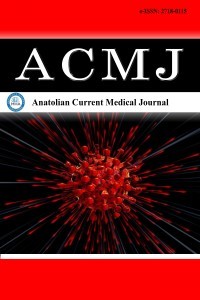
Anatolian Current Medical Journal
Yazarlar: Zuhal OZER SİMSEK
Konular:Sağlık Bilimleri ve Hizmetleri
DOI:10.38053/acmj.865035
Anahtar Kelimeler:Acinetobacter,Procalcitonin,C-reactive protein,Sepsis
Özet: Aim: Culture is the most important method in the diagnosis of infectious diseases, but with the results of culture, the diagnosis can be made late. Therefore proinflammatory markers are used for early diagnosis of infections. Procalcitonin (PCT), a precursor of calcitonin, takes part in the systemic reaction caused by circulating endotoxins and inflammatory cytokines. The aim of this study was to investigate the potential usefulness of PCT in the acinetobacter or non-acinetobacter related infection diseases. Material and Method: In this study, 63 patients with Acinetobacter spp. and 33 patients with infections due to other bacterial agents were included. Leukocyte count, C-reactive protein (CRP) and PCT were used as inflammation markers. Findings / Results: In terms of PCT value between two groups, there was a statistically significant difference. The non - acinetobacter group had higher PCT levels than acinetobacter group. CRP and White blood cell (WBC) levels were not statistically significant difference between two groups. Conclusion: According to this study PCT may be not a useful marker for acinetobacter infections as early predictive value.